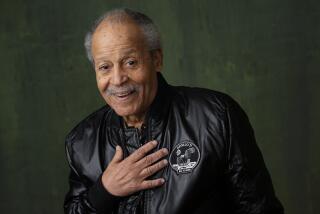A Warrior and Hero for Israel
- Share via
Ilan Ramon, a crack Israeli fighter pilot turned payload specialist, had a personal history that mirrored that of his country.
His mother and grandmother were Holocaust survivors, and his father and grandfather were comrades in arms during the Jewish state’s war for independence. Like many men his age, Ramon fought in two of Israel’s wars, the Yom Kippur War in 1973, then in Lebanon during the 1980s.
Ramon, 48, was born June 20, 1954, in the Tel Aviv suburb of Ramat Gan. But he spent part of his youth in Israel’s desert heartland, the arid Negev city of Beersheba.
He made his mark early as a pilot, graduating from the country’s prestigious air force academy as a pilot of Mirage and Skyhawk jets. He was among the first Israeli pilots to fly an F-16 fighter.
In 1981, Ramon took part in one of Israel’s boldest air missions ever: a strike on Iraq’s Osirak nuclear reactor. Israel claimed that the unfinished reactor was part of an Iraqi program to develop nuclear weapons.
In a celebrated tactic, and a remarkable feat of discipline, the Israeli pilots flew silently and undetected over Arab territory for hours in an ultra-tight formation so that their radar signature would resemble that of a commercial airliner.
Ramon had a wide grin and appeared younger than his years. He was friendly and outgoing, a lover of skiing and squash. But as sunny a demeanor as he presented to the world, the shadow of the Holocaust hung over his life.
His mother and grandmother survived the Auschwitz death camp. In a preflight interview, Ramon said that when he talked with them and other survivors, “who are pretty old today, and you tell them that you’re going to be in space as an Israeli astronaut, they look at you as a dream that they could have never dreamed. So it’s very exciting for me to be able to fulfill their dream that they wouldn’t dare dream.”
In fact, Ramon carried several pieces of Holocaust memorabilia into space. One was a small pencil drawing made by Peter Ginz, a 14-year-old Jewish boy who died at Auschwitz, who imagined the view of Earth from outer space.
Despite his “Top Gun”-style career in the air force, where he rose to the rank of colonel, Ramon wanted something more. NASA picked him as a payload specialist in 1997, and he reported for training at Johnson Space Center the next year.
Leading up to the flight, Ramon and his family lived for more than two years in Houston, plunging into a new American life.
“They really enjoyed life in Houston,” said Danny Ayalon, Israel’s ambassador to the United States. “Being with the astronauts, the Americans -- it was a very special experience for him.”
Ramon left a wife, Rona, and four young children, who were at the Kennedy Space Center in Florida waiting for the landing when the disaster occurred Saturday. Family members from Israel were rushing to be with her.
“I suppose the blow will hit me later on,” Ramon’s father, Eliezer Wolferman, told Israel Radio. “My heart goes out to Rona, who is now a young widow, a mother of four young children.... I told Rona to hang on until we get there to strengthen her, to strengthen each other.”
Ramon’s mission as the first Israeli to fly into space delighted his homeland, providing a diversion from the bloody conflict with the Palestinians.
The start of Columbia’s mission was front-page news in Israel, and everyone from pensioners to soldiers followed the daily developments.
Ramon was a secular Jew but chose to make religious observances in space, such as eating kosher meals, as a token of respect for what he called “all kinds of Jews all over the world.” He celebrated the Jewish Sabbath aboard Columbia as well.
Even in space, the Israeli-Palestinian conflict and his country’s other pressing problems weren’t far from Ramon’s mind. On Jan. 22, a week into the mission, Ramon told fellow Israelis in a live television hookup to draw strength from their “ability to survive despite everything.”
Former air force commander Eitan Ben-Eliyahu fought back tears on national television as he spoke of his protege’s decision to enter the space program. “As for choosing him, there was no way but to have chosen him,” he said.
Ayalon, the Israeli ambassador, said of Ramon: “Professionally, he was the best we could offer.”
More to Read
Sign up for Essential California
The most important California stories and recommendations in your inbox every morning.
You may occasionally receive promotional content from the Los Angeles Times.













